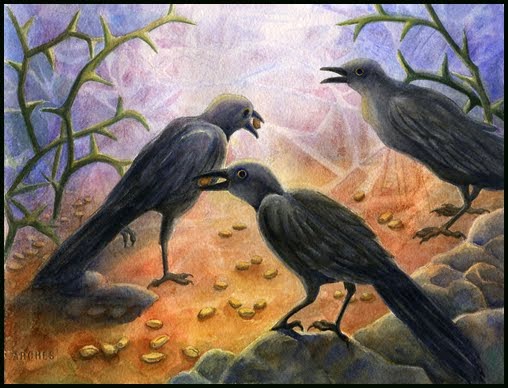Luke 8:4-18
And as a great crowd had gathered, and ever more people streamed to him out of the cities, he spoke in a parable:
A sower went out to sow his seed. As he sowed, some seed fell on the path. It was trodden upon, and the birds of the sky (air) ate it up.
 |
| The Sower, van Gogh |
His disciples asked him what this parable might mean. And he said: To you it has been given the gift of being able to understand the mysteries of the kingdom of God; but to the others, it is given in pictures and parables, for they see and do not yet see, and hear, although they do not yet understand with their thinking. The meaning of the parable is this:
The seed is the Word of God. That which fell upon the path are those who hear it; afterward, the tempter comes and tears the Word out of their hearts so that they cannot find healing through the trusting power of faith working in them.
Those on the rock are those who, when they hear the Word, take it up with joy; but they remain without root. For a while, the power of their faith works in them, but in times of trial, they fall away.
What fell under the thorns are those who hear the Word from the spirit, and as they go on their way, the sorrows and the riches and the joys of life choke it, and they bring no fruit to maturity.
And the seed which fell in the good soil are those who hear the Word, and take it up into their hearts, feel its beauty, become noble and worthy and patiently keep it alive, tending it there until it brings forth fruit.
No one lights a light and hides it under a vessel or under a bench; instead, he places it on a lampstand so that all who come in see the light. For nothing is hidden which shall not be revealed, and nothing is secret which shall not be known and proclaimed.So attend to how you listen. For he who has enlivened in himself the power to bear the spirit, to him more will be given. He however who does not have this power, from him will be taken that which he thinks he has.
2nd February Trinity
February 4, 2018
Luke 8: 14-18
In spring the soil in a garden is turned, opened, so that seed can be sown into the worked earth.
The ground in the garden of the heart also requires periodic turning. Hearts opened through turns of destiny, hearts opened through the will’s conscious intent, are fertile ground. The seed of the living spirit, the word funneling into the heart through the ear, received through intentional listening, germinates in the prepared ground of the soul.
But germination is just the beginning. The gospel makes it clear that this is only a first step. The Spirit Word wants to grow, to develop strength, to blossom and ripen. Keeping the Spirit Word alive and growing in the garden of the heart takes some effort on our part. It takes tending, patience, time.
In a simpler age, reading from the Good Book, hearing the Word of the Spirit at the end of the day was one way to keep it alive in the soul. This allowed the Word to take root. The “riches” of modern life tend to crowd out such a practice. But many find helpful the practice of refreshing the Sunday reading at home during the week.
Once the Spirit’s Words, the mystic trees that grow mankind’s future, are sprouted, the soul garden houses living beauty. The soul becomes a noble and
 |
| Alfred Soord |
The deep one, whose being I trust,
…breaks through the earth into trees,
and rises,
when I bow my head,
faint as a fragrance
from the soil. *
Our tending helps to ripen His trees’ shining fruits. The fruits that feed mankind’s future are the light of understanding, the continuing life of our souls and spirits, the nourishing of love. His fruits, ripening in our hearts, nourish us. They nourish all whom we encounter. And our fruits of soul, ripening in our hearts, nourish—Him.
Be modest now, like a thing
ripened until it is real,
so that he who began it all
can feel you when he reaches for you.**
* Rilke’s Book of Hours, pg. 101
**, pg. 96





.jpg)

